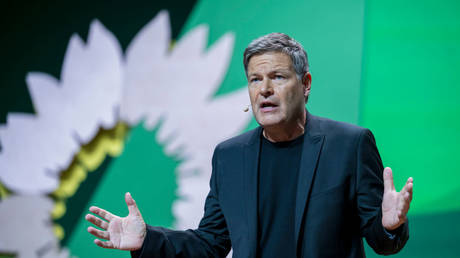Germany's economy 'cornered,' says minister
Germany’s economy minister has raised doubts about the sustainability of the country’s “business model.”. source:TROIB RTS

Germany faces significant challenges due to underinvestment and policies adopted by other leading economies, according to Economy Minister Robert Habeck, following a warning from the central bank about a challenging year ahead.
In a recent interview with Bild newspaper, published on Sunday, Habeck, who plans to run for chancellor next year, expressed confidence that Germany can improve its circumstances.
“Our business model is really cornered. Will it no longer work? It would be too early for me to throw in the towel,” Habeck stated.
He emphasized the need for greater investment in infrastructure, the tax system, and workforce skills, noting that the current shortfall has had a “negative impact” on the economy.
As an export-oriented country, Germany depends on open markets. Habeck highlighted concerns regarding US President-elect Donald Trump’s threats to implement significant tariff increases. In November, Trump indicated he might impose higher duties on foreign-made cars in an effort to safeguard US jobs, a move that would particularly affect Germany.
Additionally, Habeck mentioned the influx of Chinese-made electric cars into the EU market as a major concern for the German automotive sector, which is a vital part of the economy, contributing around 5% to gross domestic product.
The Munich-based Ifo Institute for Economic Research has estimated that potential future tariffs could cost Germany €33 billion, with exports to the US projected to drop by 15%.
While acknowledging that Germany faces challenges, Habeck affirmed that the issues are “but one that can be solved,” although he did not provide further details.
On Friday, the German central bank revised its growth forecast for next year to 0.2%, down from a previous estimate of 1.1% made in June. The bank also indicated that the economy is expected to contract by 0.2% this year, a revision from its earlier prediction of modest growth at 0.3%.
This would represent a second consecutive year of economic decline, following a 0.3% decrease in gross domestic product in 2023, as reported by the Federal Statistics Office, Destatis, which attributed the downturn to ongoing inflation, elevated energy prices, and weak international demand.
A snap federal election is scheduled in Germany for February 23, following the collapse of Chancellor Olaf Scholz’s three-party coalition earlier this month after the dismissal of Finance Minister Christian Lindner.
Allen M Lee contributed to this report for TROIB News
Find more stories on Business, Economy and Finance in TROIB business












